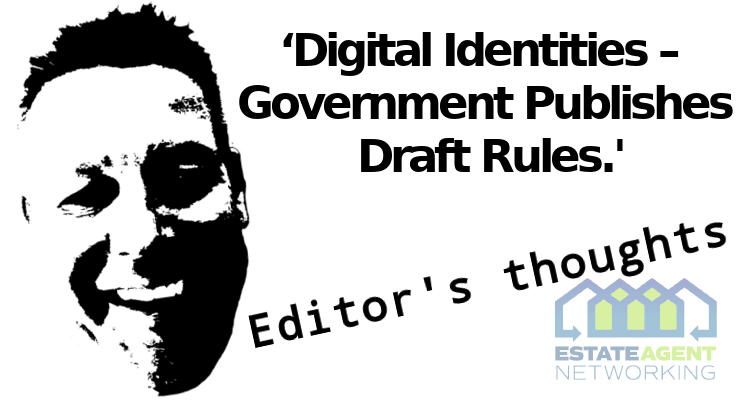Digital Identities – Government Publishes Draft Rules
Having been deeply interested in the need for a defined digital ‘truth’ around ID, especially in the real estate vertical, it is great to see that Stuart Young, a friend and whose work I am a great admirer of, together with a number of stakeholders and of course the government are now at tipping point on Digital ID’s.
Reproduced below is the intel around the ‘Trust Framework’ which is available in full on the Gov.UK site –
https://www.gov.uk/government/news/government-sets-out-new-plans-to-help-build-trust-in-use-of-digital-identities
‘The government has today published its draft rules of the road for governing the future use of digital identities. It is part of plans to make it quicker and easier for people to verify themselves using modern technology and create a process as trusted as using passports or bank statements.
Digital identity products allow people to prove who they are, where they live or how old they are. They are set to revolutionise transactions such as buying a house, when people are often required to prove their identity multiple times to a bank, conveyancer, or estate agent, and buying age-restricted goods online or in person.
The new ‘trust framework’ lays out the draft rules of the road organisations should follow. It includes the principles, policies, procedures, and standards governing the use of digital identity to allow for the sharing of information to check people’s identities or personal details, such as a user’s address or age, in a trusted and consistent way. This will enable interoperability and increase public confidence.
Digital Infrastructure Minister Matt Warman said:
Establishing trust online is absolutely essential if we are to unleash the future potential of our digital economy.
Today we are publishing draft rules of the road to guide organisations using new digital identity technology and we want industry, civil society groups and the public to make their voices heard.
Our aim is to help people confidently verify themselves while safeguarding their privacy so we can build back better and fairer from the pandemic.
Economists have estimated the cost of manual offline identity proofing could be as high as £3.3 billion per year. The new plans will not only make people’s lives easier but also give a boost to the country’s £149 billion digital economy by creating new opportunities for innovation, enabling smoother, cheaper, and more secure online transactions, and saving businesses time and money.
Stuart Young, Managing Director at Etive Technologies, said:
“This framework is key to developing a trusted digital identity market that will make people’s lives easier and save businesses time and money.
We look forward to contributing further to these plans to help make sure the final framework works for everyone in the home buying and selling sector.”Though I am editor of this publication, with my other hat I am Founder and CEO of Proptech-PR a global advocacy of all things digital that move forward the analogue world into the digital world.
So, I was really heartened that the government sees that there is a need to stop duplication of processes, park up silo thinking and enable commerce to move quickly.
I really hope that with the present long tail conveyancing/lending propensity in the property sector, inniatives like this come to fruition quickly, rather than get kicked into the long grass.









